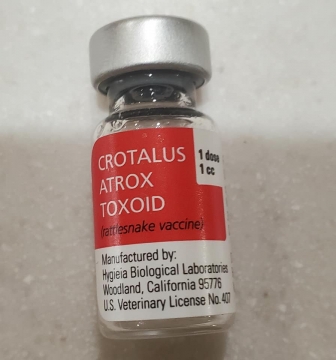 Story and photo by Rebecca Jefferis Williamson
Story and photo by Rebecca Jefferis Williamson
May 16, 2021 (San Diego’s East County) – Should you get your dog vaccinated to protect against rattlesnake bites?
The County of San Diego’s Department of Animal Services cautions that rattlesnake season is year-round, but sightings may spike during hot spells or in the summer months. The San Diego Humane Society also notes that rattlesnake bites can happen all year-round, but the worst months are from April through September. County Animal Services says rattlesnakes can show up at any time from the coast to the deserts.
In an article published by Nationwide’s Pet Health Zone, Dr. Paula Ibsen, a staff veterinarian with Red Rock Biologics, set forth the benefits of getting your dog a rattlesnake vaccine.
According to Ibsen, there are three benefits to the rattlesnake vaccine. “Besides buying you more time to get your dog to the veterinarian if he was bitten, dogs will experience a lot less pain, tissue-sluffing and swelling,” she says. “Even if there is swelling at the bite site, vaccinated dogs will normally see swelling subside within 20 minutes.”
The rattlesnake vaccine will not prevent a pet from needing veterinary care, but it will give you more time to safely get your pet to a veterinary hospital and it will decrease the negative effects of the venom and increase the chances of survival.
The initial vaccine requires a two vaccine series and then annual vaccination after that. It takes 30 days after vaccination for the antibodies to fully take effect.
According to Jessica Gerke with the Helen Woodward Animal Center in Rancho Santa Fe, the deactivated venom in the vaccine is against Western Diamondback Rattlesnakes, but fortunately, it also protect against seven different snakes with similar venom, KUSI reports:
- Western Diamondback Rattlesnake
- Prairie, Great Basin, Northern, Southern Pacific Rattlesnakes
- Sidewinder Rattlesnake
- Timber Rattlesnake
- Massasauga Rattlesnake
- Copperhead Rattlesnake
While there are veterinarians who question the efficiency of a rattlesnake vaccine; it does boil down to the dog owner’s personal decision. And certainly, if a dog does receive the vaccine, it should not lead to a false sense of security. Dog-owners should be aware of rattlesnakes in any given setting – on a hike or in a backyard.
Keep your dog on a leash in the habitat where these snakes live, especially at night. Beware of where your dog is poking around – a pile of wood or a rattlesnake friendly area.
Know the signs that a dog has been bitten by a rattlesnake, including low pressure leading to wooziness or fainting, followed by extreme swelling at the site of the bite, which spreads rapidly, along with bruising and redness. If you suspect your pet was bitten, seek emergency care.
Ralph Peters of San Diego posted on Facebook that friends of his had a puppy die from a rattlesnake bite just recently. The friends live in the Cleveland National Forest in San Diego County.
For more information on how to prevent or lesson the threat with a rattlesnake vaccine, contact your veterinarian.
You may also wish to consider rattlesnake avoidance classes for your dog, as well as removing items that may attract snakes to your yard, such as rodents, wood piles or other nesting places.
Here’s a link to the San Diego Humane Society and tips for dog owners to adhere to: https://www.sdhumane.org/about-us/news-center/stories/rattlesnake-season.html







Recent comments